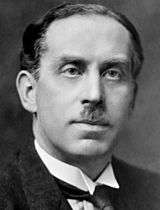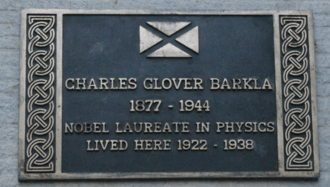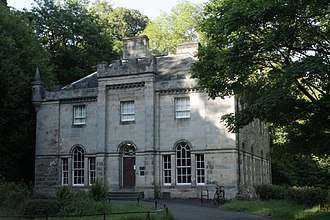Charles Glover Barkla
Charles Glover Barkla FRS[2] FRSE (7 June 1877 – 23 October 1944) was a British physicist, and the winner of the Nobel Prize in Physics in 1917 for his work in X-ray spectroscopy and related areas in the study of X-rays (Roentgen rays).[3]
Charles Barkla | |
|---|---|
 | |
| Born | Charles Glover Barkla 7 June 1877[1] |
| Died | 23 October 1944 (aged 67) |
| Nationality | British |
| Alma mater | University College Liverpool Trinity College, Cambridge King's College, Cambridge |
| Known for | X-ray scattering X-ray spectroscopy |
| Awards | Nobel Prize in Physics (1917) Hughes Medal of the Royal Society |
| Scientific career | |
| Fields | Physics |
| Institutions | University of Cambridge University of Liverpool King's College London University of Edinburgh |
| Academic advisors | J. J. Thomson Oliver Lodge |
Life
Barkla was born in Widnes, England, to John Martin Barkla, a secretary for the Atlas Chemical Company, and Sarah Glover, daughter of a watchmaker.
Barkla studied at the Liverpool Institute and proceeded to Liverpool University with a County Council Scholarship and a Bibby Scholarship. Barkla initially studied Mathematics but later specialised in Physics under Sir Oliver Lodge. During the absence of Oliver Lodge due to ill health, Barkla would replace him in lectures.[4]
In 1899 Barkla was admitted to Trinity College, Cambridge, with an 1851 Research Fellowship from the Royal Commission for the Exhibition of 1851,[5] to work in the Cavendish Laboratory under the physicist J. J. Thomson (discoverer of the electron). During his first two years at Cambridge, Barkla would, under the directions of Thomson, study the velocity of electromagnetic waves along wires of different widths and materials.
After a year and a half at Trinity College, Cambridge, his love of music led him to transfer to King's College, Cambridge, in order to sing in their chapel choir. Barkla's voice was of remarkable beauty and his solo performances would always be fully attended.[6] He completed his Bachelor of Arts degree in 1903, and then his Master of Arts degree in 1907.[7] He married Mary Esther Cowell in the same year,[8] with whom he would have two sons and one daughter.
In 1913, after having worked at the Universities of Cambridge, Liverpool, and King's College London, Barkla was appointed as a Professor of Natural Philosophy at the University of Edinburgh in 1913, a position that he held until his death.
Barkla made significant progress in developing and refining the laws of X-ray scattering, X-ray spectroscopy, the principles governing the transmission of X-rays through matter, and especially the principles of the excitation of secondary X-rays. For his discovery of the characteristic X-rays of elements, Barkla was awarded the Nobel Prize in Physics in 1917. He was also awarded the Hughes Medal of the British Royal Society that same year.
Barkla proposed the J-phenomenon as a hypothetical form of X-ray behaviour similar to X-ray fluorescence but other scientists were not persuaded that this was a different mechanism from other known effects such as Compton scattering and so the theory was not successful.[9][10]
From 1922 to 1938 he lived at Hermitage of Braid in south-wesr Edinburgh.[11]
He died in Edinburgh on 23 October 1944.
Personal life


A religious man, Barkla was a Methodist and considered his work to be "part of the quest for God, the Creator".[12][13][14]
Public Recognition
The lunar crater Barkla was named in the honour of Charles Barkla.
A plaque exists on Barkla's house at Hermitage of Braid in Edinburgh. A commemorative plaque has been installed in the vicinity of the Canongate, near the Faculty of Education Buildings, at the University of Edinburgh. Additionally, a lecture theatre at the University of Liverpool's Physics department, as well as a Biophysics laboratory in the Biological science department,[15] are named after him. In 2012 a gritter in Barkla's home town of Widnes was named in his honour, following a competition run by the local newspaper.[16]
References
- "Charles Glover Barkla - Biographical". nobelprize.org.
- Allen, H. S. (1947). "Charles Glover Barkla. 1877-1944". Obituary Notices of Fellows of the Royal Society. 5 (15): 341–366. doi:10.1098/rsbm.1947.0004. JSTOR 769087.
- Shampo, M. A.; Kyle, R. A. (1993). "Charles Barkla--Nobel Laureate". Mayo Clinic Proceedings. 68 (12): 1176. doi:10.1016/s0025-6196(12)60068-8. PMID 8246619.
- Brigham Narins (2001), Notable Scientists from 1900 to the Present, A–C, p. 129, ISBN 0787617520,
Barkla studied experimental physics under Oliver Lodge, for whom he occasionally substituted as lecturer.
- 1851 Royal Commission Archives
- Brigham Narins (2001), Notable Scientists from 1900 to the Present, A–C, p. 129, ISBN 0787617520,
Barkla had an excellent voice (said to be either baritone or bass according to various biographers) which drew crowds for his solo performances.
- "Barkla, Charles Glover (BRKL899CG)". A Cambridge Alumni Database. University of Cambridge.
- "Archived copy" (PDF). Archived from the original (PDF) on 19 September 2015. Retrieved 30 March 2015.CS1 maint: archived copy as title (link)
- Wynne, Brian (1976), "C. G. Barkla and the J Phenomenon: A Case Study in the Treatment of Deviance in Physics", Social Studies of Science, 6 (3/4): 307–347, doi:10.1177/030631277600600303, JSTOR 284686
- Michael Mulkay (2014), Science and the Sociology of Knowledge, p. 79, ISBN 978-1317651185
- Plaque to Barkla, Hermitage of Braid
- School of Mathematics and Statistics. "Charles Glover Barkla" (2007), University of St Andrews, Scotland. JOC/EFR.
- Allen, H. S. (1947). "Charles Glover Barkla. 1877-1944". Obituary Notices of Fellows of the Royal Society. 5 (15): 341–366. doi:10.1098/rsbm.1947.0004. JSTOR 769087.
- Charles Glover Barkla, Complete Dictionary of Scientific Biography (2008)
- "Archived copy". Archived from the original on 10 November 2013. Retrieved 2014-01-03.CS1 maint: archived copy as title (link)
- "A gritter named Barkla" Physics World Volume 25 Number 02, February 2012
External links
| Wikimedia Commons has media related to Charles Glover Barkla. |
- Charles Glover Barkla on Nobelprize.org including the Nobel Lecture, June 3, 1920 Characteristic Röntgen Radiation
- Obituary
- his discovery of the characteristic Röntgen radiation of the elements
- Biography at Encyclopedia.com
